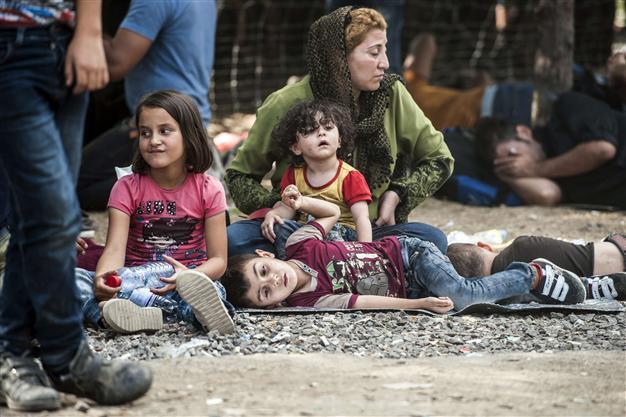Migrants rest in a refugee center in Presevo, on August 25, 2015. AFP Photo
Germany on Aug. 25 said it had eased asylum rules for Syrians in a move expected to relieve pressure on southern European nations as thousands more migrants pour into the bloc.
Record numbers of people are streaming into EU member Hungary from Serbia, posing a new headache for regional leaders who will meet this week at a summit to be dominated by Europe's worst migrant crisis since World War II.
As criticism mounts over the bloc's response to the crisis, Germany said it has stopped returning Syrian asylum-seekers to their first EU port of entry, becoming the first member state to effectively simplify the application process for those fleeing the brutal civil war.
"Simply put, Europe is in a situation that is not worthy of Europe," German Chancellor Angela Merkel said, calling for a "dialogue with the people" on how to redistribute the refugees fairly within the EU.
Natasha Bertaud, spokeswoman for the EU Commission, said Germany's move was "recognition of the fact that we cannot leave the member states at the external borders alone in dealing with a large number of asylum seekers seeking refuge in Europe."
Under the so-called Dublin rules, the first EU country where an asylum-seeker arrives is usually required to process the claimant's application.
In practice, this means countries on the EU's borders like Greece or Italy are overwhelmed with applications as thousands arrive on their shores after a dangerous journey across the Mediterranean.
Hungary, another country on the edge of the EU, is rushing to build a vast razor-wire barrier to keep migrants out.
The European Commission said it stood ready to provide Hungary with emergency EU facilities as Budapest struggles to cope with the record numbers.
Almost 2,100 people, the highest ever daily total, crossed into Hungary on Aug. 24 near the town of Roszke, one of the few sections of the border not yet sealed off by the fence.
They were among 7,000 refugees whose gruelling journey to the EU was temporarily blocked last week when Macedonia declared a state of emergency and shut its borders for three days to halt the huge influx.
Authorities reopened the crossing after chaotic scenes that saw police throwing stun grenades at migrants trying to break through the border.
"We were stopped in Macedonia for two days. The riots were terrible," said a 29-year-old IT engineer from Mosul in Iraq who said he had left home to escape the Islamic State of Iraq and the Levant (ISIL). He asked not to be named.
"Police used guns and tear gas. I saw an old woman beaten, her money and papers taken."
The UN's refugee agency said it expected the number of refugees moving through Macedonia to double to 3,000 a day, many of them children.
It warned that the situation was also worsening in Greece and Italy, where the number of people arriving after crossing the Mediterranean this year is approaching 300,000.
Since the beginning of 2015, more than 2,370 people have drowned in the Mediterranean, already exceeding the death toll for the whole of 2014, according to the International Organisation for Migration.
The UN called on Europe to "establish a human-rights based, coherent and comprehensive migration policy".
"Let's not pretend that what the EU and its member states are doing is working," said the UN's special rapporteur on migrants' rights, Francois Crepeau.
He called for "opening up the regular labour markets through smart visas" for migrants.
His comments came as Britain announced tough new measures against illegal migrant workers, with those caught working without permits in England and Wales facing up to six months in prison.
The migration crisis is set to dominate the Vienna summit of leaders from the western Balkans region on Thursday that will also be attended by Merkel, whose country expects to take in a record 800,000 migrants this year.
The western Balkans has now become one of the main routes into the EU.
More than 1,700 migrants were massed on Aug. 25 in Serbia's Miratovac camp, waiting for an opportunity to cross into Hungary and onward to more prosperous EU countries like Germany or Sweden.
Austria, which lies on the route north, said it was deploying more than 500 troops to help overstretched authorities deal with the influx from Hungary and Italy, while Bulgaria also sent soldiers to reinforce its border crossings with Macedonia.
A key issue at the summit will be the huge number of citizens from conflict-free Balkan states seeking EU asylum in the past year, with nearly half of those arriving in Germany coming from countries like Albania and Kosovo.
